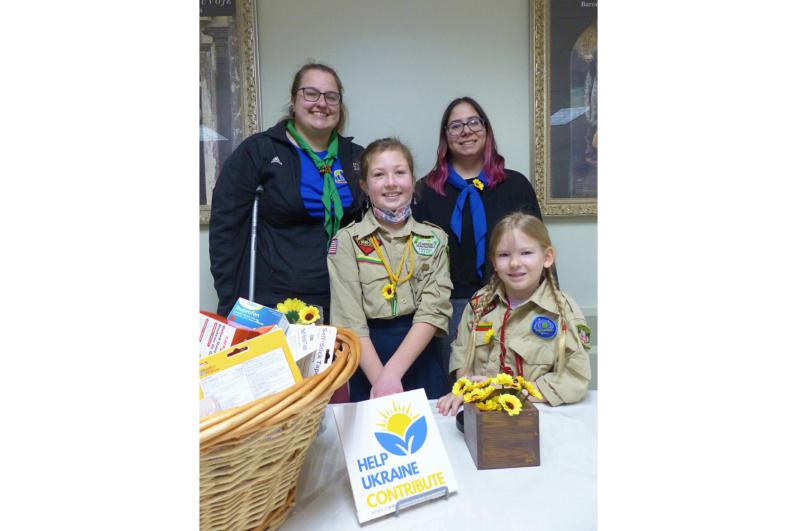Lithuanian parish expresses solidarity with Ukraine, rallies to send aid
SOUTH BOSTON -- When people hear about terrible events and learn that others are in need, the common response is an impulse to do something to help. That impulse is even stronger when those with means to help have a personal connection with those in need.
This has been the case for St. Peter Lithuanian Parish and the people of Ukraine. Cognizant of Lithuania's similar history and geographic proximity to Ukraine, the parish and other local Lithuanian organizations have rallied to pray, raise funds, and collect supplies for Ukrainians suffering because of Russia's invasion of their country.
Many Lithuanians in the Boston area grew up hearing stories of how World War II ravaged their homeland. Lithuania and Ukraine were both ruled by Russia for many years, but have been independent countries in the three decades since the fall of the Soviet Union.
Even before Russian forces invaded Ukraine on Feb. 24, the people of St. Peter Lithuanian Parish were already praying for peace. As the Russian military maneuvers began, parishioners remembered the situation in their prayers for the faithful, interceding for the people of Ukraine and its neighboring countries.
"We've been praying consistently for this situation," said Aldona Lingertat, co-director of the archdiocese's Lithuanian apostolate.
At the first Sunday Mass following the invasion, the parish had a moment of silence for those who had been killed. The faithful stood as an organist and violinist played the Ukrainian national anthem.
"It was very sobering. It was just the start, and it touched all of us," Lingertat said.
Gloria Adomkaitis, who co-directs the Lithuanian apostolate with Lingertat, said it has been "very unsettling, horrifying to watch the news reports." She said the invasion of Ukraine feels "close to home."
Her mother's family was deported to Siberia when the Russians took over Lithuania. She has first cousins in Lithuania, who she said are "living in fear."
Adomkaitis said the fear is that if Russia takes over Ukraine, they will also go after the other Baltic states including Lithuania.
Lingertat echoed the sentiment, saying it seems like this invasion "might just be the start of instability and terror."
"If Russia can invade a neighbor such as the Ukraine, a huge country, we worry about our relatives in our little country of Lithuania," Lingertat said.
Her own cousins and their children and grandchildren still live in Lithuania.
"Most of us have great concern and worry about our relatives and the Church in Lithuania, which has always been persecuted under the Soviets," Lingertat said.
Lithuanian Scouts leader Rita Stuopis said Lithuanians old enough to remember World War II are experiencing something like flashbacks, as the news of present events brings back memories of past trauma.
"Their hearts go out to what's going on now, because they have a direct reference of understanding," she said.
World War II spurred many Lithuanians to leave their country -- including Lingertat's parents, who married in a displaced persons camp before immigrating to the U.S. Now, the invasion of Ukraine has caused millions of people to flee to neighboring countries.
"Given these experiences and having heard first-person stories of the hardships of refugees, I am especially troubled by the news reports about the difficulties the refugees of the Ukraine are facing," Lingertat said.
In the midst of these anxieties, the Lithuanian community has stepped up to provide practical help to Ukrainian organizations, recognizing the people of Ukraine as their neighbors in more than one sense.
The Lithuanian Club hosted a benefit concert on March 12 to raise funds for Ukraine. It was the community's first major public event since the coronavirus pandemic began, with over 200 attendees, including guests from the Ukrainian community.
The club donated the food, and artisans and craftspeople sold their art. The open bar donated the profits from drinks -- and even created a yellow and blue signature cocktail named for Ukraine's president, Volodymyr Zelensky. By the end of the evening, the community had raised about $15,000, according to Adomkaitis.
The Lithuanian Scouts also conducted a donation drive, collecting medical supplies -- namely bandages, Neosporin, aspirin, ibuprofen, batteries, and flashlights -- to make first aid backpacks for the Sunflower of Peace Foundation. When they received donations of items that the foundation is not accepting, they sought out other charities, such as Ukraine Forward and NuDay Ukraine, that could utilize them.
While overseeing this effort, scout leader Stuopis has been making and selling pins shaped like sunflowers, a symbol of Ukraine, and using the profits to cover the cost of shipping their donations. Lingertat said many people are wearing the sunflower pins to show their support of Ukraine.
Lingertat called the scouts' donation drive "a beautiful way to support people in need."
"I picked up aspirin, bandages, ibuprofen, and I feel like here's my contribution," she said.
Adomkaitis said it feels good to "do something concrete" rather than feel helpless while watching the news.
"This is a simple way of helping. It's not a grand gesture, it's not something that's going to change drastically what's going on, but someone in Ukraine that is able to take an ibuprofen to relieve some pain that they're suffering, and maybe know that some little Girl Scout somewhere back in America collected it for them -- it goes a long way, I think," she said.



















